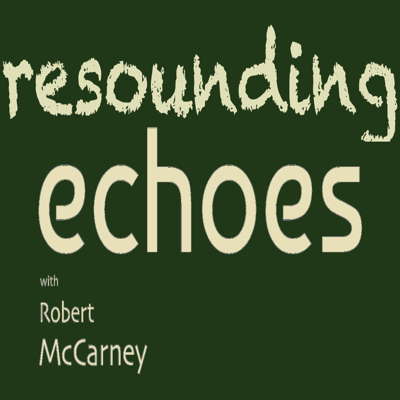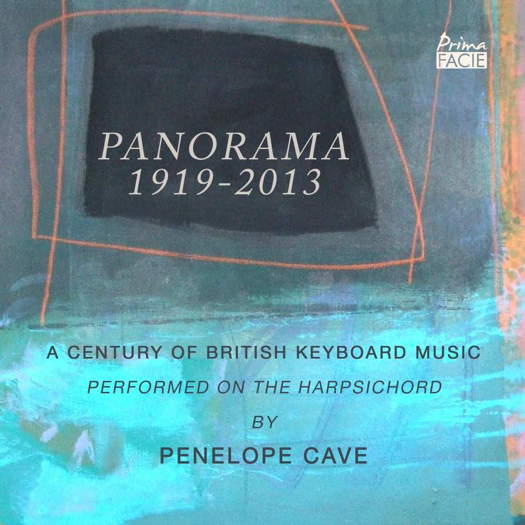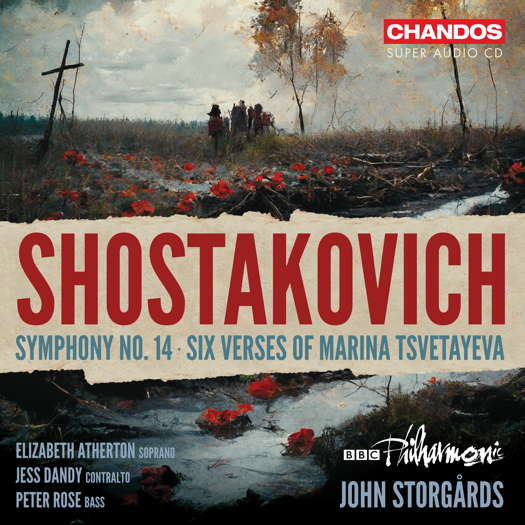- Piermarini Hall
- Thomas Füri
- Dan Rowe
- Martino Tirimo
- John Blitheman
- Kazán
- Orchestra of Teatro La Fenice
- Nebraska
 RESOUNDING ECHOES: Beginning in 2022, Robert McCarney's occasional series features little-known twentieth century classical composers.
RESOUNDING ECHOES: Beginning in 2022, Robert McCarney's occasional series features little-known twentieth century classical composers.
 SPONSORED: CD Spotlight. A Fantastic Collection. Penelope Cave Panorama CD. Little-known harpsichord gems, strongly recommended by Alice McVeigh.
SPONSORED: CD Spotlight. A Fantastic Collection. Penelope Cave Panorama CD. Little-known harpsichord gems, strongly recommended by Alice McVeigh.
All sponsored features >>

Strange and Haunting
GEOFF PEARCE listens to music for voices and orchestra by Shostakovich
'... testament to John Storgårds' abilities to interpret this strangest of all Shostakovich's works ...'
I was a young lad when I first heard Dmitri Shostakovich's Symphony No 14 in 1970. (It was written the previous year.) I did not warm towards it at first and I mistakenly thought that it was based on Thomas Mann's Death in Venice, but I later learned that it set eleven poems by four authors who died either unnaturally or prematurely, and that most of the poems dealt with death. I have another recording of this work (conducted by Rostropovich) and I got to like it a great deal. I suppose that the first time I heard the work, I was somewhat put off by the whole idea of death.
The disc starts, however, with Six Verses of Marina Tsvetayeva (1892-1941), Op 143a from 1974, for contralto and orchestra (originally conceived for piano and contralto). The poet had a sad and troubled life, and the music reflects this. It was written a year before Shostakovich died, and whilst he was on holiday after receiving notification of a fatal illness. Whilst thematic threads connect all the songs, it is not generally regarded as a song cycle.
The first song, 'My Verses', is brooding, reflective and quite dark, and it would seem as if the reflection looking back on life and work was not a happy one, but more one of resignation.
Listen — Shostakovich: My Verses (Six Verses of Marina Tsvetayeva)
(CHSA 5310 track 1, 2:25-3:12) ℗ 2023 Chandos Records Ltd :
The second song, 'Whence all this tenderness', deals with anguished love, and there are figures that I suspect are used in his Symphony No 13 that have been transplanted here. The song is sombre and almost a lamentation.
'Dialogue between Hamlet and his Conscience' features a solo viola as the counterpart to the contralto. It is a meditation, as the title would suggest, and apart from the occasional impassioned outburst, is generally very subdued and brooding.
'No, the drum did beat' is impassioned, has strange spikey xylophone interjections, and depicts Pushkin being carried from the field after his fatal duel. This is the shortest of the songs.
Listen — Shostakovich: No, the drum did beat (Six Verses of Marina Tsvetayeva)
(CHSA 5310 track 4, 0:22-0:59) ℗ 2023 Chandos Records Ltd :
'The poet and the Tsar' looks at the relationship between Pushkin and Tsar Nicholas I. This is a quirky little song with odd snatches of a march that appear briefly at times.
Tubular bells appear throughout the last song, 'To Anna Akhmatova', and there are references to Khachaturian's Second Symphony, entitled The Bells.
Listen — Shostakovich: To Anna Akhmatova (Six Verses of Marina Tsvetayeva)
(CHSA 5310 track 6, 2:20-3:06) ℗ 2023 Chandos Records Ltd :
Jess Dandy has a rich voice and knows how to use her dark and dramatic tones to the full advantage in this strange and haunting work.
Symphony No 14, as I said earlier, is eleven settings of verse of four writers who met an untimely end, and most are around the subject of death. This, to me, is one of the most challenging of Shostakovich's symphonies. Most of the movements use themes constructed from tone rows and he also makes dramatic use of tone clusters. The work is dedicated to Benjamin Britten, who was the conductor of the first performance I heard.
'De Profundis' (Lorca) is slow and brooding and begins with a theme rather like the 'Dies Irae', which is used in many of the following movements. The bass voice adds particular gravitas to this most sombre of movements.
Listen — Shostakovich: De Profundis (Symphony No 14)
(CHSA 5310 track 7, 2:33-3:19) ℗ 2023 Chandos Records Ltd :
'Malagueña', also a setting of Lorca, is an impassioned but anguished little song for soprano and strings. It is shot full of Spanish rhythms and the almost frenetic string writing reminds me of Benjamin Britten. It ends abruptly.
The next section, 'Loreley', to text by Guillaume Apollinaire, is a terse conversation between the soprano and bass and is quite descriptive of the legend. It is imaginative and quite riveting. The second part is quieter and subdued, as the Loreley had been transformed and seductively tried to lure sailors of the Rhine to death.
Listen — Shostakovich: Loreley (Symphony No 14)
(CHSA 5310 track 9, 1:11-2:09) ℗ 2023 Chandos Records Ltd :
'The Suicide', another Apollonaire setting, is a longish song that goes through quite a few emotions as probably one would go through during such an event. Unfortunately there are no printed lyrics within the booklet, which would have been very helpful.
'On Watch', Apollinaire again, is a quirky little piece that largely features percussion accompanying the soprano with a rather march-like figure.
Listen — Shostakovich: On Watch (Symphony No 14)
(CHSA 5310 track 11, 1:00-1:58) ℗ 2023 Chandos Records Ltd :
This is followed by a little short section 'Madam, Look!' (also Apollonaire). This uses both the bass and soprano and involves a man witnessing a woman dropping something, then picking it up and breaking out laughing.
'In the Santé Prison' - Apollinaire again - is a long song, reflecting the despair and reminiscences of the poet who was imprisoned for three weeks in Santé Prison in 1911. Time stands still, but life outside the prison goes on.
Listen — Shostakovich: In the Santé Prison (Symphony No 14)
(CHSA 5310 track 13, 4:38-5:24) ℗ 2023 Chandos Records Ltd :
'The Zaporozhian Cossacks' Answer to the Sultan of Constantinople' - the symphony's last Apollinaire setting - is defiant and charged with tension.
Wilhelm Küchelbecker's text 'O Devig, Delvig' was dedicated to his poet friend Anto Delvig. It questions what the rewards are for good deeds and poetry when surrounded by tyrants and fools. Shostakovich's setting is a sad, lamenting song for bass and strings.
Rilke's 'The Poet's death' describes a poet in his last moments upon his deathbed. This is sad and restrained music, but full of peace and resignation.
Listen — Shostakovich: The Poet's death (Symphony No 14)
(CHSA 5310 track 16, 3:30-4:29) ℗ 2023 Chandos Records Ltd :
The very short closing section, in which the two vocal soloists - soprano Elizabeth Atherton and bass Peter Rose - are brought together very briefly, is quite enigmatic, ends abruptly and perhaps reflects Shostakovich's own belief that to rail against and defy death is pointless, and after it, there is nothing.
This, Shostakovich's penultimate symphony, is quite a challenge for me, and remains so to this day. The performance it receives here, along with the six songs at the beginning of the disk, is testament to John Storgårds' abilities to interpret this strangest of all Shostakovich's works, and the soloists and BBC Philharmonic Orchestra have the vocal and emotional ability to convey this. This is not cheerful or uplifting music, but it does leave one to ponder about life and our ultimate death. This is possibly why it is not performed often, as it is quite unsettling. One useful thing would have been the addition of the text. Otherwise, the booklet notes are insightful.
Copyright © 8 June 2023
Geoff Pearce,
Sydney, Australia



